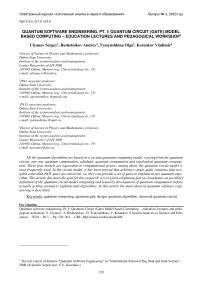Quantum software engineering. Pt. I: quantum circuit (gate) model based computing - education lectures and pedagogical workshop
Автор: Ulyanov Sergey, Reshetnikov Andrey, Tyatyushkina Olga, Korenkov Vladimir
Журнал: Сетевое научное издание «Системный анализ в науке и образовании» @journal-sanse
Статья в выпуске: 3, 2020 года.
Бесплатный доступ
All the quantum algorithms are based on a certain quantum computing model, varying from the quantum circuit, one-way quantum computation, adiabatic quantum computation and topological quantum computation. These four models are equivalent in computational power; among them, the quantum circuit model is most frequently used. In the circuit model, it has been proved that arbitrary single-qubit rotations plus two-qubit controlled-NOT gates are universal, i.e. they can provide a set of gates to implement any quantum algorithm. This article discusses the goal for this research: it is to given a lightning-fast (as-barebones-as-possible) definition of the quantum circuit model computing and leisurely development of quantum computation before actually getting around to sophisticated algorithms. In this article the main ideas of quantum software engineering is described.
Quantum computing, quantum gate design, quantum algorithm, universal quantum circuit
Короткий адрес: https://sciup.org/14123318
IDR: 14123318 | УДК: 512.6,
Список литературы Quantum software engineering. Pt. I: quantum circuit (gate) model based computing - education lectures and pedagogical workshop
- Loceff, M. A Course in Quantum Computing for the Community College. – Foothill College. – 2015. – Vol. 1.
- Entwicklungsstand Quantencomputer / F. K. Wilhelm [et al.]. – Federal Office for Information Security. – 2017.
- Rue, J., Xambo, S. Mathematical essential of quantum computing. – ICMAT Severo Ochoa Project SEV-2011-0087 (Spain). – 2020.
- Upgrading the Bloch sphere: Projective space foliated by Klein bottles as a geometrical representation of two-qubit states and their entanglement / O. Perdomo [et al.] // arXiv:1903.01940v1 [quant-ph]. – 5 Mar 2019.
- Kregar, A., Ramšak, A. Qubit transformations on Rashba ring with periodic potential // New J. Phys. – 2020. – Vol. 22. – No 8. – Pp. 083048.
- Marzari N, et al. Maximally localized Wannier functions: Theory and applications // arXiv:1112.5411v2 [cond-mat.mtrl-sci]. – 12 May 2012.
- Tabakin, P. Model Dynamics for Quantum Computing // arXiv:1611.00664v2 [quant-ph]. Annals of Physics. – 2017. – Vol. 383. – Pp 33–78.
- Superconducting quantum computing: A Review / H-L. Huang [et al.] // arXiv:2006.10433v1 [quant-ph]. – 18 Jun 2020.
- Willsch, D. Supercomputer simulations of transmon quantum computers // arXiv:2008.13490v1 [quant-ph] 31 Aug 2020.
- CMOS Position-Based Charge Qubits: Theoretical Analysis of Control and Entanglement / E. Blokhina [et al.] // IEEE Access. – 2020. – Vol. 8. – Pp. 4182–4197.
- Quantum computational chemistry / S. McArdle [et al.] // Review of modern physics. – 2020. – Vol. 92. – No 1.
- Ivancova, O. V., Korenkov, V. V., Ulyanov, S.V. Quantum software engineering Textbook 2: Quantum supremacy modelling. Part I: Design IT and information analysis of quantum algorithms. – M. : Kurs. – 2020.
- Ivancova, O.V., Korenkov, V.V., Ulyanov, S.V. Quantum software engineering Textbook 2: Quantum supremacy modelling. Part II: Quantum search algorithms simulator – computational intelligence toolkit. – M. : Kurs. – 2020.
- CMOS-based cryogenic control of silicon quantum circuits / X. Xue [et al.] // arXiv:2009.14185v1 [quant-ph]. – 29 Sep 2020.
- Randomized compiling for scalable quantum computing on a noisy superconducting quantum processor / A. Hashim [et al.] // arXiv:2010.00215v1 [quant-ph]. – 1 Oct 2020.
- Quantum Computer-Aided design of Quantum Optics Hardware / J. S. Kottmann [et al.] // arXiv:2006.03075v1 [quant-ph]. – 4 Jun 2020.
- Armenakas, A. E., Baker, O. K. Application of a Quantum Search Algorithm to High-Energy Physics Data at the Large Hadron Collider // arXiv:2010.00649v1 [quant-ph]. – 1 Oct 2020.


